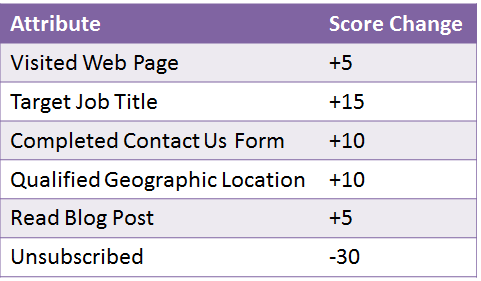Lead Generation
Lead Scoring: How it can Help your Sales Team Win more Deals

Delia T.
Delia T. | Aug 08, 2018 | 5 MIN READ
Aug 08, 2018 5 MIN READ

Inbound marketing helps you generate more leads to your website. However, the big challenge is just starting. What are you going to do with all of these leads? Most marketers send them straight to their sales team, but not all the leads are actually qualified.
This is not great news, considering the fact that you've used lots of resources to attract and convert these leads. Not to mention the time spent by the sales teams to contact and try to close them.
Moreover, not all the qualified leads will necessarily turn into clients. Actually, a part of them isn't ready yet to make a purchase; they're still taking their time to research or evaluate.
So how do you manage to separate the good leads from the ones that do nothing but waste your sales team's precious time?
Here's where lead scoring, an automated system, helps you or your marketing team to identify the leads that are ready to convert.
Lead scoring allows using your prospects' behavior in order to put the leads that made it to your list out of pure curiosity on hold while focusing on the ones that are genuinely interested in your products or services. Lead scoring helps you:
- Save your sales team's time. They will be able to focus only on the leads that are ready to convert;
- Align marketing with sales by tracking some common goals.
- Increase your ROI.
 In the previous image you'll be able to have a more graphic view of why lead scoring is important, instead of passing all leads to your sales team and wasting countless hours on the phone trying to close a sale, you are picking just the right green ones, those you are ready to buy, and nurture the orange ones, those who already made some points in your score but still need some more nurturing to do, this simple image explains at a glance how lead scoring can save your company tons while shortening your sale cycle.
In the previous image you'll be able to have a more graphic view of why lead scoring is important, instead of passing all leads to your sales team and wasting countless hours on the phone trying to close a sale, you are picking just the right green ones, those you are ready to buy, and nurture the orange ones, those who already made some points in your score but still need some more nurturing to do, this simple image explains at a glance how lead scoring can save your company tons while shortening your sale cycle.
There are several platforms to use for lead scoring and you can do it manually as well. HubSpot is hands down one of the greatest and user-friendly platform for lead scoring. Other two renowned options are Marketo and Acquia.
Whether you’re going for a platform, or you want to do lead scoring manually, you have to choose the criteria you want to measure through lead scoring.
The lead scoring system has to be based on information that proves: the degree of matching between the leads and the company, the level of interest and the level of activity.
Based on these 3 categories, here are some examples of criteria that you can measure by lead scoring:
1. Criteria for matching
- the role of the lead in the company
- the size of the company
- the company industry
You can extract this information using the conversion form and it will show you whether or not this lead matches your buyer persona profile.
2. Criteria for interest
- number of eBooks downloaded
- number of blog articles read
- whether or not they've downloaded a demo
- types of web pages visited
These actions can be analyzed by using a lead management program that records each lead interaction with the website.
3. Criteria demonstrating activity level
- number of completed conversion forms
- number of web pages visited
This information shows how active a lead is on your website. If a lead visits many web pages, reads many articles, or downloads many eBooks, then it matches your buyer persona profile thus is more likely to make a purchase.
Set a score for each criterion
In order to measure the level of activity and interest, the lead scoring system provides a certain score for each activity. It's recommended that this score is established during a meeting between the marketing and sales teams to ensure that these leads are real sales opportunities.
For example, you can set a scale from 0 to 100, in which:
- a read article is 2 points
- a downloaded eBook is 5 points
- an email open is 4 points
- a product or service page visit is 10 points
- a price list visit is 15 points
- a contact page visit is 20 points
With a lead management platform such as HubSpot, when the lead gets a certain score (for example 65), it automatically switches from MQL to SQL and is assigned to a sales representative.
At the end of the day you should have something similar to this example presented in Medium blog article "This is Why Your Lead Scoring Sucks"
Last but not least, review your lead scoring system regularly (at least every 3 to 6 months) along with your Sales team. This way, you'll make sure that the results are analyzed efficiently and that your qualification is being correctly applied based on how many deals your Sales team closed from the leads Marketing provided. Plus, companies that have aligned marketing and sales generate way more revenue from marketing.
TABLE OF CONTENTS
Stay Updated with Our
Latest Posts
Subscribe now to receive the freshest content, insights, and updates directly in your inbox.

Recent Articles


2024 © The Orange Box Agency – All rights reserved




.png?width=90&height=90&name=facebook%20(1).png)
.png?width=94&height=96&name=Vector%20(1).png)